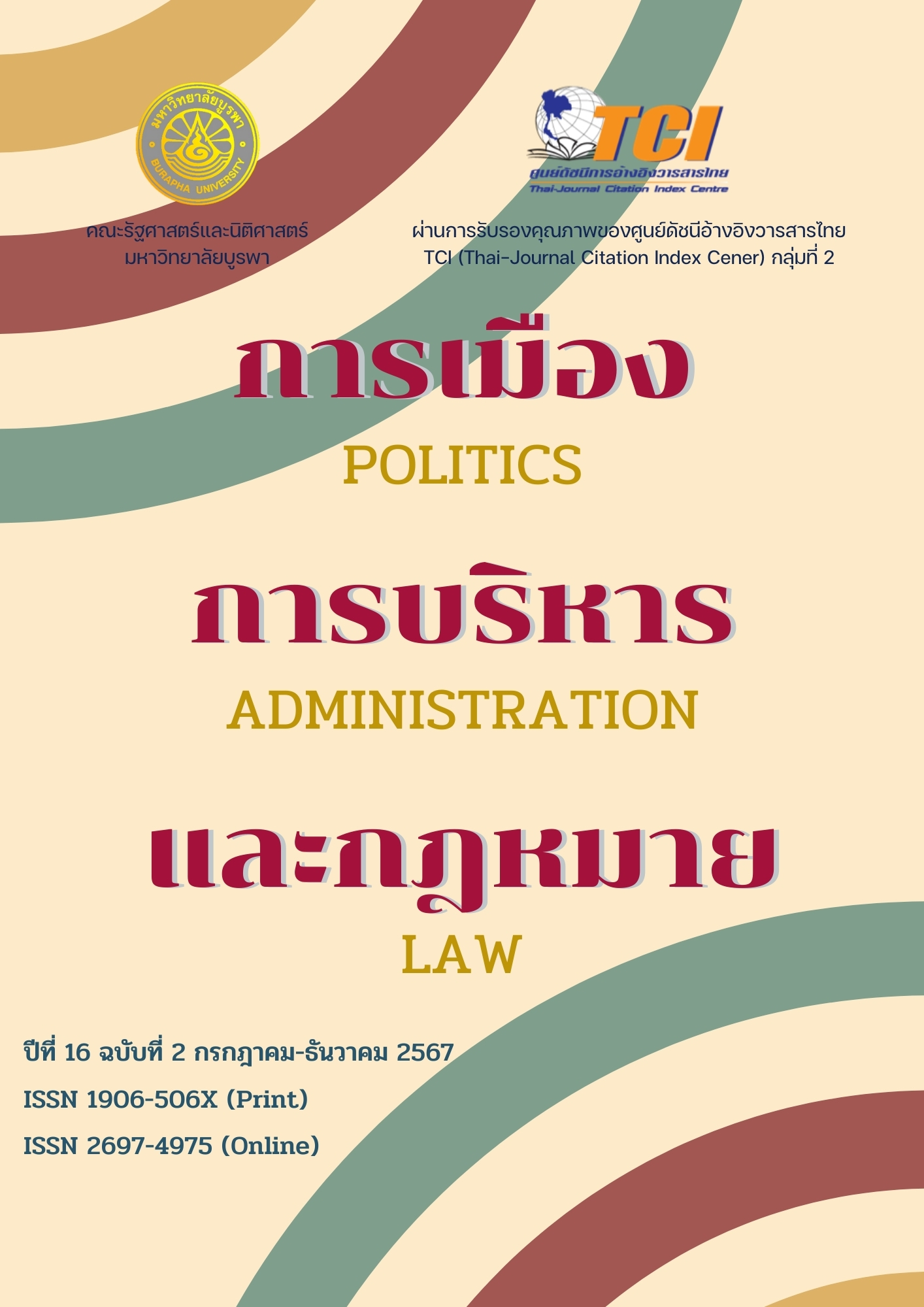การประยุกต์ใช้การตำรวจชุมชนเพื่อควบคุมการแพร่ระบาดโรคติดเชื้อไวรัสโคโรนา 2019 (โควิด 19) ในประเทศไทย
คำสำคัญ:
การตำรวจชุมชน โรคติดเชื้อไวรัสโคโรนา 2019 (โควิด-19) เครือข่ายชุมชนท้องถิ่นบทคัดย่อ
การวิจัยเรื่องการประยุกต์ใช้การตำรวจชุมชนเพื่อควบคุมการแพร่ระบาดโรคติดเชื้อไวรัสโคโรนา 2019 (โควิด 19) ในประเทศไทย มีวัตถุประสงค์เพื่อศึกษาปัจจัย แนวคิด วิธีการ และแนวทางปฏิบัติที่ส่งผลต่อการนำแนวคิดการตำรวจชุมชนมาประยุกต์ใช้เพื่อควบคุมการแพร่ระบาดของโรคโควิด 19 ในประเทศไทย ในช่วงปี พ.ศ. 2563 โดยใช้วิธีการศึกษาเชิงคุณภาพในรูปแบบของการวิจัยเอกสารการสัมภาษณ์เชิงลึก และการสนทนากลุ่ม มีกลุ่มประชากรเป้าหมาย คือ เจ้าหน้าที่รัฐ อาสาสมัครสาธารณสุขประจำหมู่บ้าน อาสาสมัครตำรวจบ้าน และประชาชนในพื้นที่ 5 จังหวัด ประกอบด้วย กรุงเทพมหานคร สมุทรปราการ สุราษฎร์ธานี นครราชสีมา และเชียงใหม่ ซึ่งเป็นพื้นที่ที่มีการแพร่ระบาดของโรคติดเชื้อดังกล่าว
ผลการศึกษาพบว่า สถานีตำรวจในพื้นที่เป้าหมายสามารถประยุกต์ใช้หลักการตำรวจชุมชนในการป้องกันและควบคุมสถานการณ์การแพร่ระบาดของโรคโควิด 19 ได้เป็นอย่างดี โดยเจ้าหน้าที่ตำรวจชุมชนมีหน้าที่ประสานความร่วมมืออย่างใกล้ชิดกับหน่วยงานภาครัฐที่เกี่ยวข้องและผู้นำชุมชนในการปฏิบัติตามนโยบายและมาตรการของรัฐบาลด้านสาธารณสุข ซึ่งปัจจัยที่ส่งผลต่อความสำเร็จในการประยุกต์ใช้แนวคิดตำรวจชุมชน คือ ภาวะผู้นำของหัวหน้าชุมชนและหัวหน้าส่วนราชการที่เกี่ยวข้อง นโยบาย มาตรการและการบังคับใช้กฎหมายของรัฐ ภาคีเครือข่ายในชุมชนท้องถิ่น และการมีส่วนร่วมของประชาชนในท้องถิ่น ดังนั้น สำนักงานตำรวจแห่งชาติจึงควรนำแนวคิดการตำรวจชุมชนมาประยุกต์ใช้ในการป้องกันภัยสาธารณะรูปแบบอื่นที่ไม่ใช่อาชญากรรม อาทิ การแพร่ระบาดของ โรคโควิด19 โดยจัดเตรียมเจ้าหน้าที่ตำรวจชุมชนที่ได้รับฝึกอบรมเป็นอย่างดีให้สามารถรับมือกับปัญหาภัยสาธารณะรูปแบบต่างๆ อันอาจจะเกิดขึ้นได้ตลอดเวลา
เอกสารอ้างอิง
ภาษาไทย
กระทรวงสาธารณสุข, กรมควบคุมโรค. (2563). โรคโควิด 19 (COVID-19). วันที่ค้นข้อมูล 10 ธันวาคม 2567, เข้าถึงได้จาก https://ddc.moph.go.th/viralpneumonia/faq_more.php
กระทรวงสาธารณสุข, กรมสนับสนุนบริการสุขภาพ. (2556). การสร้างเครือข่ายและการมีส่วนร่วมในการปรับเปลี่ยนพฤติกรรมของชุมชน. วันที่ค้นข้อมูล 10 ธันวาคม 2567, เข้าถึงได้จาก C:/Users/HP-PC/Downloads/080420151827433659_linkhed.pdf
เกษม นครเขตต์. (2554). เอกสารวิชาการ แนวคิดและทฤษฎีเครือข่ายทางสังคม (Social Network Theory). กรุงเทพฯ: กระทรวงสาธารณสุขร่วมกับสำนักงานกองทุนสนับสนุนการสรางเสริมสุขภาพ (สสส.).
จีระศักดิ์ เจริญพันธ์ และสุนทร เดชชัย. (2554). การพัฒนาภาคีเครือข่ายการพัฒนาหมู่บ้านต้นแบบตามแนวคิดปรัชญาเศรษฐกิจพอเพียงมุ่งสู่สังคมอยู่เย็นเป็นสุข. วันที่ค้นข้อมูล 10 ธันวาคม 2567, เข้าถึงได้จาก https://cscd.kku.ac.th/uploads/proceeding/190811_154736.pdf
ตะติยาวัฒน์ สุวรรณศรี, ธนพัฒน์ สีหะวงศ์, นันทธรรมรัตน์ สังประกุล, และปวริศ แพงปัสสา. (2563). การสร้างภาคีเครือข่ายเพื่อการป้องกันอาชญากรรม [เอกสารรายงานวิชาสัมมนาหมวดวิชาการตำรวจ หลักสูตรผู้กำกับการ รุ่นที่ 125]. กรุงเทพฯ: วิทยาลัยการตำรวจ.
บวรศักดิ์ อุวรรณโณ และถวิลวดี บุรีกุล. (2550). ประชาธิปไตยแบบมีส่วนร่วม = Participatory democracy. นนทบุรี: สถาบันพระปกเกล้า.
ประกาศกระทรวงสาธารณสุข เรื่อง ชื่อและอาการของโรคติดต่อที่ต้องเฝ้าระวัง (ฉบับที่ 3) พ.ศ. 2565. (2565, 20 กันยายน). ราชกิจจานุเบกษา. เล่ม 139 ตอนพิเศษ 223 ง.
ประสิทธิ์ ตาตินิจ และลำปาง แม่นมาตย์. (2556). การสร้างภาคีหุ้นส่วนในการบริหารเทศบาลตำบลท่าพระ อำเภอเมือง จังหวัดขอนแก่น. วารสารวิจัย มข. มส. (บศ.), 1(2), 73-84.
เรณุมาศ รักษาแก้ว (2557). การมีส่วนร่วมของประชาชน. ฐานข้อมูลการเมืองการปกครองสถาบันพระปกเกล้า. วันที่ค้นข้อมูล 10 ธันวาคม 2567, เข้าถึงได้จากhttp://wiki.kpi.ac.th/index.php?title=การมีส่วนร่วมของประชาชน
สัมมนา แก้วมาก, สุทธิชัย เทียนโพธิ์, เสาวนีย์ กุญชะโร, และ อุรัมพร ขุนเดชสัมฤทธิ์. (2563). ตำรวจมวลชนสัมพันธ์ในยุคโควิด 19 กรณีศึกษาชุมชนบ้านบางเทา [เอกสารรายงานวิชาสัมมนาหมวดวิชาการตำรวจ หลักสูตรผู้กำกับการ รุ่นที่ 124]. กรุงเทพฯ: วิทยาลัยการตำรวจ.
สำนักงานตำรวจแห่งชาติ. (2556). คู่มือการบริหารงานป้องกันปราบปรามอาชญากรรม พ.ศ. 2556. กรุงเทพฯ: โรงพิมพ์ตำรวจ.
สำนักงานเลขาธิการสภาผู้แทนราษฎร. (2562). ตำรวจชุมชน. Academic Focus. วันที่ค้นข้อมูล 10 ธันวาคม 2567, เข้าถึงได้จาก http://www.parliament.go.th/library
ภาษาอังกฤษ
Adecco. (2563). 5 ทักษะภาวะผู้นำที่ต้องมีในภาวะวิกฤติ. วันที่ค้นข้อมูล 10 ธันวาคม 2567, เข้าถึงได้จาก https://adecco.co.th/th/knowledge-center/detail/5-leadership-skills-in-crisis-management
Bureau of Justice Assistance. (1994). Understanding community policing: a framework for action. Bureau of Justice Assistance. Washington, D.C.: The Bureau.
Li, M. (2017). Collaborative Governance and Partnerships in Policing. Open Journal of Social Sciences, 5, (pp.50-58). Retrived December 2, 2023, from https://www.scirp.org/pdf/JSS_2017121115100474.pdf
Wilson, S. (2020, 6 April). Three reasons why Jacinda Ardern’s coronavirus response has been a masterclass in crisis leadership. ABC News. Retrived December 2, 2023, from https://www.abc.net.au/news/2020-04-06/coronavirus-jacinda-ardern-leadership/12124300
World Health Organization. (2020). Coronavirus disease (COVID-19) pandemic. Retrived December 2, 2023, From https://www.who.int/emergencies/diseases/novel-coronavirus-2019
ดาวน์โหลด
เผยแพร่แล้ว
ฉบับ
ประเภทบทความ
สัญญาอนุญาต

อนุญาตภายใต้เงื่อนไข Creative Commons Attribution-NonCommercial-NoDerivatives 4.0 International License.






